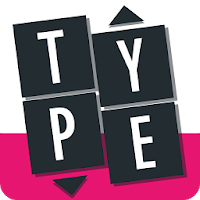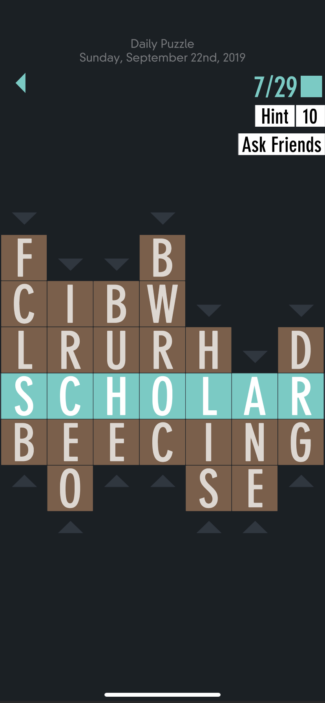The Case of the Golden Idol
LQ: 9.85
Recommended Age: 12+
Skills Used: Focus, Working Memory, Mathematics, Reading

Typeshift has elements of crosswords and Boggle or Scrabble. The player is given a collection of letter tiles in rows and columns. Each column can slide up and down. The player must use every letter tile to make a word at least once. When they use a tile, it turns blue. Tiles may be used more than once. When all the tiles in a level have turned blue, the play has completed the level.
There are multiple different packs of puzzles available. They very in size and difficulty, and some are free while others cost money. There are even packs with special twists, such as the ones which have clues for the words the player is supposed to find. There is also a collection of stats, a limited number of hints, and daily puzzles. The player can also favorite a word or look up its definition.
Typeshift contains in-app purchases and ads. The ESRB rated it E for Everyone and LW4K stands by this rating. It is important to note, however, that this game relies heavily on vocabulary and spelling skills. It is best for kids at least 10 or older.
Typeshift helps kids practice and improve the following skills:

Adapting and adjusting to changing conditions and expectations.
Some of the words in the level are common or easy to see. Some of the words, however, use unusual letter combinations or are rarer words in general. This means that the player must remain flexible and try a variety of new things. If they do not stay flexible, the player will be unable to find all the words. If they don’t find all the words, they can't finish the level and unlock new puzzles.
Arranging and coordinating materials in order to complete a task.
Players must also be able to use their organizational skills. If they can’t reorganize the letters in their head and on the screen—organizing the ideas they have for new words, in other words—they will not be able to get all of the letters used and turned blue. If they can’t get all the letters turned blue, they will be unable to unlock new puzzles.
This game requires a certain amount of reading skills to be able to play successfully—but it can also build and expand on the players skills. First, the player will be working on their spelling skills by building words and seeing the different letter combinations. Secondly, any new word that a player comes across is a word they can learn by using the game’s dictionary feature. If there is a more experienced reader watching or playing along with the player, they also have the opportunity for discussion and practice using the new words in conversation.
All membership plans come with full access to our entire suite of tools learning guides, and resources. Here are a few of the ones we think you’ll like the most: